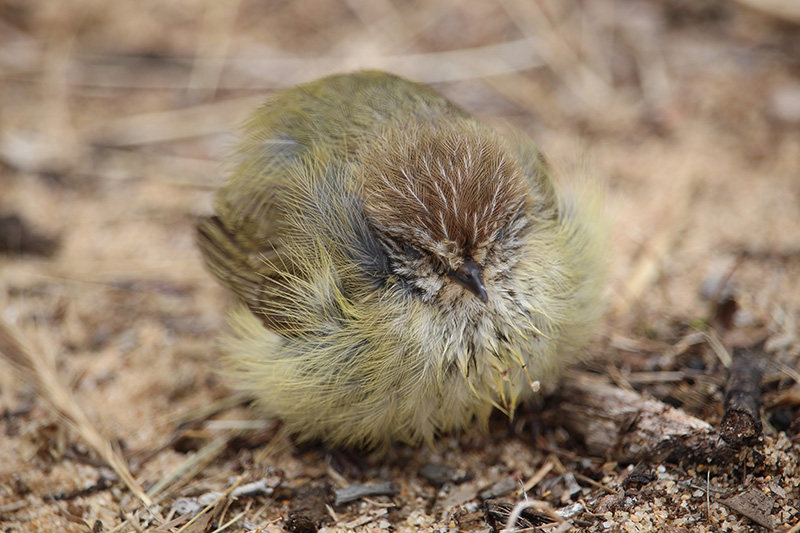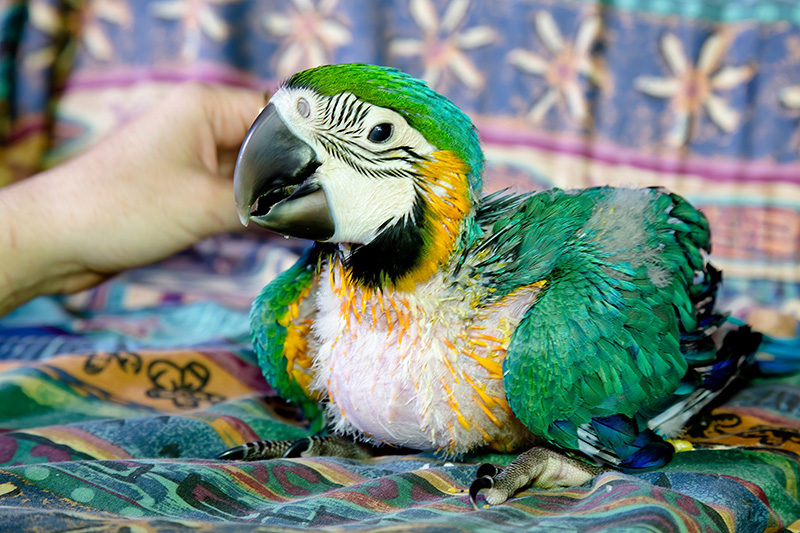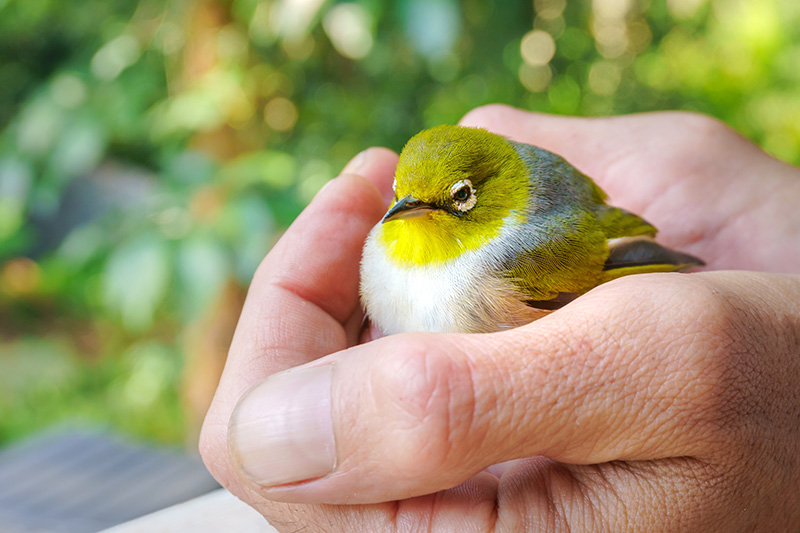Help Wild Birds
If you find an injured or sick bird, knowing what to do could help save its life.
Being handled is particularly stressful for a bird that’s already suffering and may cause further harm unless you do it carefully. Anxiety caused by human contact combined with shock resulting from injury can also be fatal for a bird.
A further problem is that encountering an ailing bird can be distressing for the person who finds it, making it more challenging to make the right decisions.
Here, you’ll find out what to do if you find an injured or sick wild bird or a bird that’s been orphaned.

Caring for an Injured or Sick Bird
If you find an injured or sick bird, it needs to be kept still, quiet, and warm. The bird may be in shock but may recover quickly if monitored and kept safe.
If the bird is seriously injured or diseased, you need to minimise its stress levels. At the same time, please seek professional advice on how to help it. You can call our helpline for such advice on 1300 596 457
Caring for an injured bird or sick bird yourself entails:
- wrapping the bird loosely in a blanket or towel – this helps to keep the bird calm and prevents movement that could do further damage. Injured or sick birds feel much better when wrapped in something protective;
- gently placing the bird in a secure, well-ventilated box;
- keeping it in a warm, dark space; and
- keeping the bird away from disturbances such as noise, pets, or children.
Don’t give the bird food or water. Injured or sick birds are generally too frightened to eat or drink, and trying to force-feed them can result in choking.
If you get help from a bird rescue service like Wildlife Rescue Australia (1300 596 457), the bird shouldn’t need food or water for the short time it’s in your care.
First Aid for Injured Birds
Bleeding
Shock
If you come across a bird in shock, chances are it will be weak, unresponsive, breathing in slowly and out quickly.
- Put the bird somewhere quiet, warm, and humid, with not too much light
- Don’t try to make it eat or drink
The bird should recover in four to six hours. If it doesn’t, seek advice by calling a bird rescue number or Wildlife Rescue Australia on 1300 596 457.
Broken Wing or Broken Leg
If a bird has an apparent injury, such as a broken wing or broken leg, it will need veterinary attention as soon as possible.
Meanwhile, you can:
- wrap the bird in a clean towel;
- put the bird in a shoebox;
- ensure the bird is warm and out of reach of pets or children; and
- call your vet or a bird rescue organization to determine what to do next.

Orphaned Birds
If you find a baby bird on its own, check to make sure it really has been orphaned.
Birds may outgrow their nests when still immature, and the parents continue to feed their young as they learn to forage and fly. During this time, parent birds call and search for their young to feed them.
If you come across a feathered baby bird on the ground, it’s best to leave it alone and watch from a distance while you wait to see whether its parents return.
Some birds – kookaburras and parrots, for example – can fly straight from the nest. Others – such as currawongs, magpies, and noisy miners – leave the nest well before they’re able to fly properly.
These birds can often be seen on the ground, flapping their wings and running and hopping to develop their flight muscles. This is normal. The parent birds will still keep feeding and protecting them and teaching them to forage for food.
In other cases, baby birds often just need a little assistance to be reunited with their parents, and you can help by locating the nest in a nearby tree or shrub and returning the nestling. Almost all birds will accept their young back if they’ve been separated for less than 24 hours
If you can’t help reunite a baby bird with its parents, you should:
-
Call Wildlife Rescue Australia (1300 596 457) for advice.
Birds of Prey
If you see a sick, injured or orphaned bird of prey such as a hawk, eagle or owl, keep your distance unless the bird is in immediate danger, and phone Wildlife Rescue Australia on 1300 596 457
Predators by nature, raptors may lash out in self-defence with their sharp beak and talons when they find themselves in an emergency situation and feel threatened.
While waiting for rescue assistance, you should keep children and animals away from the area.
Minimise disturbance to the bird and get professional help as soon as possible. Don’t try to feed or water the bird unless advised to do so.
How to Handle a Grounded Bird
If a grounded bird cannot see, it won’t stress and struggle so much. So, before trying to move it, you should gently place a T-shirt or small, lightweight towel over the bird’s head. Preferably, this should also cover the rest of the bird’s body, including the feet (to avoid scratches from claws when picking up the bird).
Then you can pick up the bird using both hands on either side of its abdomen to support its body. If a grounded bird’s wings are splayed, leave them as they are. It may fold them in itself. If not, and you’re unsure you can safely move the bird like this, get expert help.
If you can safely move the bird, wrap it in something warm, place it in a box with plenty of ventilation, and keep the box in a warm. dark place. You can line the box with newspaper or clean cloth – don’t use hay or straw, which can cause a fungal lung infection.
If you’re not confident about handling a grounded bird, you should:
-
cordon off the area around the bird.
-
keep away threats to the bird, such as traffic, dogs and cats, and other wildlife.
-
call Wildlife Rescue Australia (1300 596 457).

Protecting Yourself When Handling a Wild Bird
Even if a grounded bird isn’t a raptor, you can still get injured by a snapping beak or sharp claws. This is natural defensive behaviour. The bird doesn’t know you’re trying to help it and will perceive you as a threat. So you should wear protective gloves.
Gloves not only protect against physical injury when handling a bird, they also provide a barrier against the many diseases birds may carry.
It’s never a good idea pick up a wild bird with your bare hands. Instead, you should:
-
wear thick canvas or cloth gloves – like gardening gloves;
-
use a towel to pick up the bird if you don’t have suitable gloves handy;
-
wash your hands immediately after handling the bird.
If you need to handle a grounded bird, always keep it away from your face to protect yourself.
How to Get Expert Help for a Wild Bird in Distress
You can report a sick, injured or orphaned bird by using the 24-hour rescue hotline operated by Wildlife Rescue Australia (WRA) – 1300 596 457.
We can advise you on how to help the bird and arrange for a rescuer to come and retrieve it if necessary.
Keeping the hotline number handy means you won’t have to frantically search around online for “injured bird rescue near me” or “bird rescue number” should you come across a bird that needs help.
Our WRA emergency call centre is staffed by home-based coordinators trained to help in all aspects of animal rescue.
If you’d like to join our ranks to help to help injured, sick or orphaned birds and other animals, you can apply here.